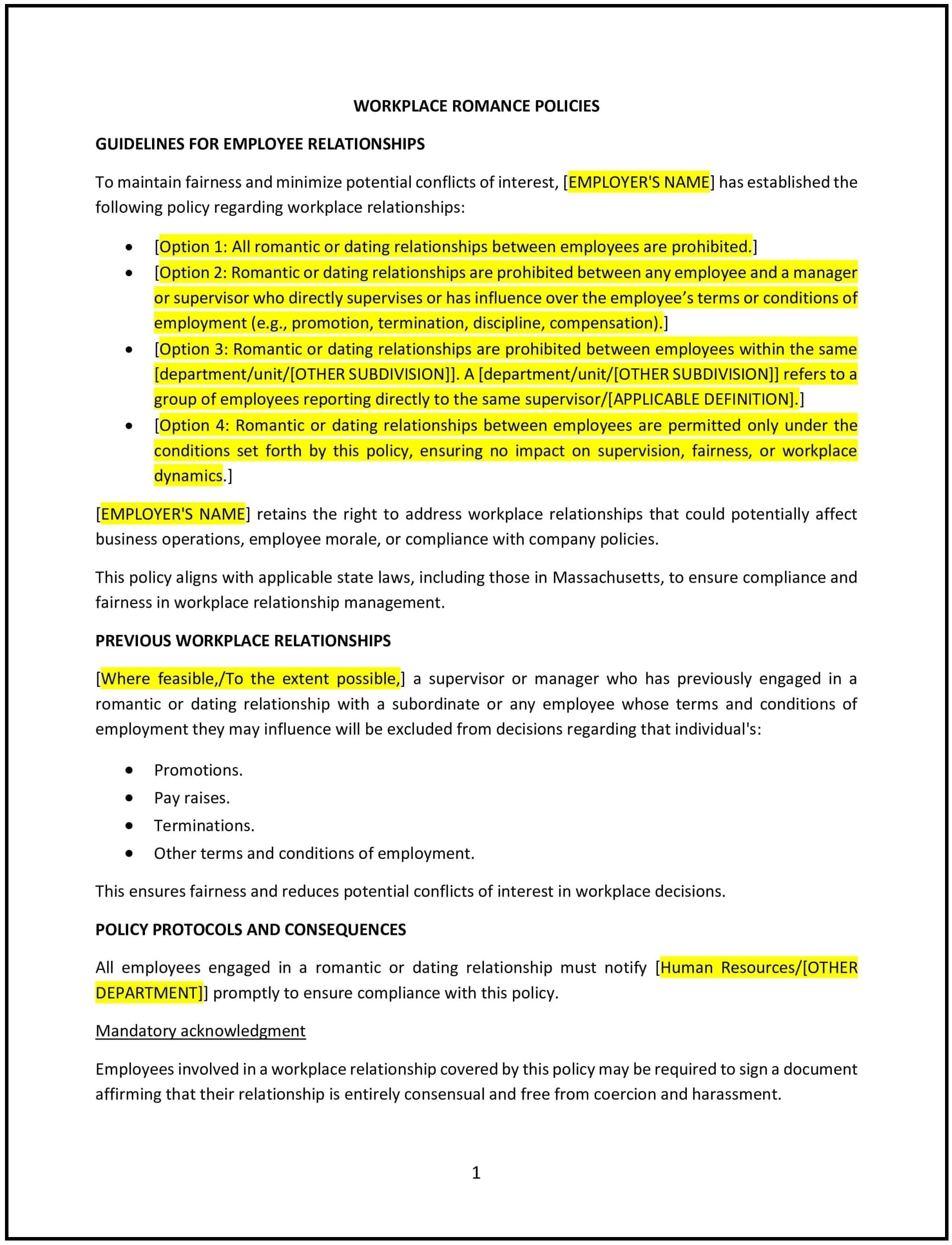Workplace romance policy (Massachusetts): Free template
Got contracts to review? While you're here for policies, let Cobrief make contract review effortless—start your free review now.

Customize this template for free
This workplace romance policy is designed to help Massachusetts businesses manage relationships between employees in the workplace in a professional and respectful manner. The policy outlines the company’s approach to handling romantic relationships between colleagues, addressing potential conflicts of interest, maintaining professionalism, and ensuring a comfortable work environment for all employees. It also provides guidance on disclosure requirements and appropriate behavior when workplace romances occur.
By adopting this policy, businesses can reduce the risks of favoritism, conflicts, and workplace disruptions while promoting a respectful, professional atmosphere for all employees.
How to use this workplace romance policy (Massachusetts)
- Define workplace romance: Clearly define what constitutes a workplace romance under the policy. This includes relationships between employees of all levels, as well as any relationships that may involve supervisors and subordinates. The policy should provide examples to clarify what is considered a romantic relationship.
- Set expectations for disclosure: Establish clear expectations for when employees should disclose a workplace romance. The policy may require employees to inform HR or management if they enter into a romantic relationship with a colleague, particularly if it involves a supervisor-subordinate relationship.
- Address conflicts of interest: Define how the company will handle potential conflicts of interest that may arise from a romantic relationship, such as situations where an employee is in a position to influence the other employee’s job assignments, promotions, or performance evaluations.
- Maintain professionalism: The policy should emphasize that employees in romantic relationships must maintain a professional demeanor in the workplace. This includes refraining from inappropriate displays of affection, maintaining objectivity in their work, and treating all colleagues with respect.
- Outline the company’s stance on favoritism: The policy should make it clear that favoritism or preferential treatment based on romantic relationships is not tolerated. It should specify the steps the company will take if such behavior is observed, including disciplinary action if necessary.
- Ensure compliance with Massachusetts state laws: The policy should comply with Massachusetts state laws regarding workplace conduct, discrimination, and harassment, including the Massachusetts Fair Employment Practices Law. The policy should clarify that any form of harassment or discrimination related to a workplace romance is prohibited.
- Review and update regularly: Periodically review and update the policy to ensure it remains compliant with Massachusetts state laws, federal regulations, and any changes in the company’s operations or workplace culture.
Benefits of using this workplace romance policy (Massachusetts)
This policy offers several benefits for Massachusetts businesses:
- Reduces the risk of conflicts of interest: By addressing potential conflicts of interest up front, businesses can avoid situations where romantic relationships interfere with decision-making, job assignments, or performance evaluations.
- Promotes a respectful work environment: The policy encourages employees to maintain professionalism in the workplace, helping to ensure that romantic relationships do not disrupt the work environment or make other employees feel uncomfortable.
- Minimizes the risk of harassment or discrimination: Clear guidelines on behavior and disclosure reduce the risk of workplace harassment or discrimination related to romantic relationships, creating a safer environment for all employees.
- Improves employee relations: A transparent and fair policy helps employees feel more comfortable in the workplace, knowing that there are clear expectations regarding workplace relationships. This can improve overall morale and communication.
- Enhances company reputation: A well-defined policy demonstrates that the company is committed to professionalism, fairness, and compliance with laws, which can strengthen the company’s reputation both internally and externally.
- Promotes legal compliance: The policy helps businesses comply with Massachusetts state laws and federal regulations regarding workplace conduct, harassment, and discrimination, reducing the risk of legal claims or lawsuits.
Tips for using this workplace romance policy (Massachusetts)
- Communicate the policy clearly: Ensure that all employees are aware of the workplace romance policy and understand the expectations regarding behavior and disclosure. Include the policy in the employee handbook and review it during onboarding or regular team meetings.
- Provide training on workplace conduct: Offer training for all employees on professional behavior, including the importance of maintaining a respectful work environment and avoiding conflicts of interest in relationships.
- Enforce the policy consistently: The policy should be enforced fairly and consistently across all levels of the organization. Ensure that any issues related to workplace romances are handled promptly and in accordance with the policy.
- Encourage disclosure when necessary: Employees should feel comfortable disclosing romantic relationships when required by the policy. HR should be available to discuss any concerns employees may have regarding the disclosure process.
- Monitor the work environment: HR and management should actively monitor the work environment to ensure that relationships do not lead to favoritism or any form of workplace disruption. Address issues proactively before they escalate.
- Review and update regularly: Periodically review the policy to ensure it remains compliant with Massachusetts state laws, federal regulations, and any changes in the company’s operations or workplace culture. Update the policy as needed to reflect best practices.